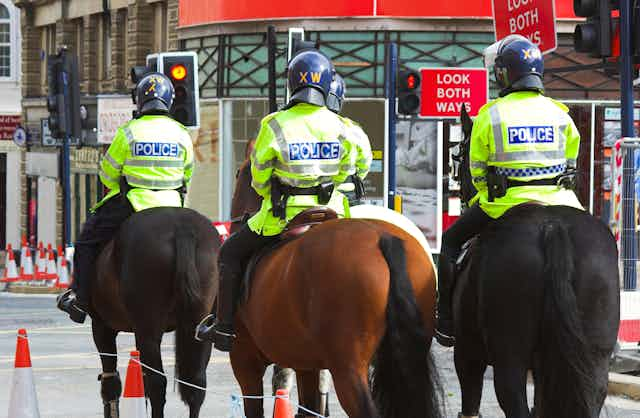Boris Johnson’s announcement that the Conservative Party will put 20,000 additional police officers on the streets of England and Wales has drawn much attention. The politics of police numbers has such strength that the Liberal Democrats immediately committed to matching the Conservative Party numbers. The Labour Party, meanwhile, pledged to add a further 2,000 police officers to the commitments from the other parties.
But, while the public wants to see more police officers on the streets, trust in political leaders is at an all-time low. And questions remain about how high-profile announcements will translate into reality.
Indeed, when Boris Johnson was mayor of London, he announced a drive to recruit 5,000 new police officers. This turned out be 5,000 officers replacing others who had retired or moved on to new jobs. This is why it’s important to look closely at the detail of what’s being proposed.
The real picture
The Conservative Party has committed itself to the recruitment of 6,000 police officers in the first year of a new parliament. This is to be followed by a further 14,000 new officers across the next two years.
But while this sounds like welcome news, the past decade has seen massive cuts in police spending. So although 20,000 new police officers may sound like a massive boost, the reality is that the Conservative’s proposal will not quite replace the 20,600 police officers who have been cut since 2010. And of course, replacing those who have left – often with years of experience – with new recruits it is not simply a case of “like for like”.
This period has also seen a decline in the number of police community support officers (PCSOs), special constables and police staff. Indeed, figures show that the police workforce as a whole has fallen by 40,000 between March 2010 and March 2019. This has had a significant impact upon police capacity and has enhanced public concerns about violent crime.
A vote winner?
Public interpretations of effective policing often reflect how safe people feel in their own neighbourhood and the visible presence of police officers can help to address community insecurities. So a headline announcement of 20,000 more police officers on the streets is one most voters will welcome – despite what this might mean in real terms.
Johnson is by no means on his own in playing politics with the police. Tony Blair’s emphasis on building a Labour Party that was strong on law and order bore witness to a continued focus upon strengthening the frontline of policing. And, moving further back in history to the previous extended period of Conservative government, Margaret Thatcher began her three terms in office with high-profile support for the police – with increased numbers and improved wages and working conditions.
The risk of riots
There may also be a potentially much more serious explanation of the need for 20,000 police officers, though. Thatcher’s support for increased police numbers, pay and conditions arrived immediately prior to a period of extensive social conflict which included riots and serious disorder taking place in each year of the 1980s. Thatcher knew she needed the police on her side.
The parallels 40 years later are stark. Not only is the UK split in terms of its future vision for the nation, but there are also the associated social, political and economic consequences of the upcoming election and Britain’s relationship with the European Union and the rest of the world. Politicians of all colours have acknowledged the potentially negative social impact of continued division.

The current policing strategy for England and Wales is Policing Vision 2025 which set out a ten-year plan from 2015 onward to deliver transformative change and which recognises the need to prioritise prevention, vulnerability and risk management. Of course, this kind of language is not going to turn heads in the heat of an election battle but its bland managerial tone masks the high-level challenges faced by policing organisations.
The way crimes are carried out has also changed massively over the years. And the challenges presented by cybercrime, money-laundering, along with the transnational trafficking of drugs and people continues to grow and to affect communities. To address the most harmful crimes, while keeping the public on board in this politically polarised nation, remains the ultimate challenge for policing.
Politics and policing
At Sheffield Hallam University, we are working with our local police force on the delivery of police training. And it is easy to see some of the challenges the politics of policing causes in terms of planning for the future delivery of police services.
Most notable is how to ensure you recruit the right people to address present and future challenges while engaging them with appropriate training and education that prepares them for frontline police work.
There are significant resources required to regenerate the infrastructure that has been pulled apart since 2010 to ensure that new officers receive sufficient and appropriate support from the existing frontline who are the mentors of this new generation.
But of course, in all of this, it’s important to remember that training new police officers takes time. And that the number of “bobbies on the beat” will not be boosted overnight – even if it may seem that way from party manifestos.


